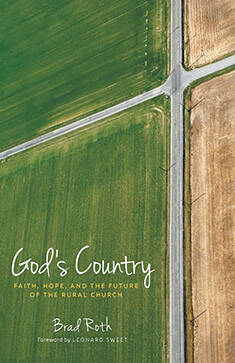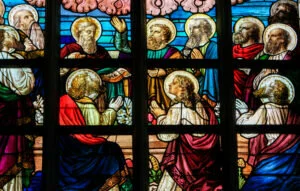On a Saturday evening at the end of July, I found myself preaching at a congregation so rural that Google Maps couldn’t tell me how to get there. This small white-framed church was part of a tri-point parish. They were currently without a pastor and were at the mercy of other pastors nearby to fill in week after week, hence worship on a Saturday night.
When I stepped into that congregation I was overcome with nostalgia. It reminded me of my first parish—a dual-point parish where one congregation (Concordia Lutheran) was located in a town of ninety people and the other congregation (Immanuel Lutheran) was located in a town of only nineteen people.
It all came flooding back to me on this sweltering Saturday evening typical of late July. Before the service started, I noticed a picture hanging in the church narthex. Upon closer inspection it was actually a collection of eighteen pictures: portrait photos of every pastor who had ever served this congregation, beginning with its first pastor in 1884.
Under each portrait was the name of the pastor and the years of his service. The shortest recorded pastorate was a span of three years. The longest was twenty-nine. Regardless, the math is simple: eighteen pastors over 136 years puts the average pastorate at seven and a half years. This reminded me of Brad Roth’s suggestion about ‘abiding’ from his book God’s Country. “Perhaps a rule of thumb for abiding should be seven years, a lovely, biblical number” (p. 66).
Given the incarnation of Christ, Roth asserts that abiding should be the norm. It should be our default position. Sorrowfully, in rural locales, abiding feels like the exception instead of the norm. Roth’s diagnosis of this problematic reality rings true. Abiding in rural locales “reminds us how small we are” (p. 68).Given the incarnation of Christ, Roth asserts that abiding should be the norm. It should be our default position. Abiding is difficult because we are “addicted to the fresh start” (p. 65). Abiding in rural parishes is difficult because “rural places feel like jilted spouses. The best and brightest left us for someone more urbane” (p. 65).
I cannot stress strongly enough how much I agree with each of those points. Abiding is difficult. There’s always a fancier church with a larger budget and “better opportunities” somewhere else. To abide is to eschew those opportunities for self in order to love and serve others.
The topic of abiding is near to my heart because I still bear the fresh wounds of having left. After seven years and two months in my small dual-point parish, I took a call to serve a much larger and not-quite-as-rural congregation. Making that announcement—twice! I might add, on account of my parish’s dual-point nature—was the most difficult announcement I’ve ever made in my life.
I was following the call of Jesus, but I felt like Judas.
It wasn’t until I left that I noticed a lacuna in Roth’s book. Other than calling seven years a “lovely, biblical number” (which, incidentally, I reached) Roth provides no framework for evaluating when it is time for a pastor to leave a parish. ‘Abiding’ can certainly influence a pastor to stay put, but can ‘abiding’ influence a pastor to leave? Though counterintuitive, the answer is “yes.”
The best way to answer these questions is to evaluate the concept of “abiding” as a spectrum. Located in the middle of the spectrum is the value “abiding.” Located on either side of this value are two theological errors that I will label as “using” and “usurping.”
Abiding
Abiding is valuable not as an end unto itself but because it reflects the love of Jesus Christ. As preachers, teachers, and proclaimers of Jesus Christ, our job is to deliver Christ to the people and the people to Christ. It’s one thing to tell your parishioners that Jesus thinks each one of them is worth dying for, but the words ring hollow when the pastor preaching these words can’t be bothered to sacrifice anything of himself to serve, love, and abide with the people to whom he preaches and is called.
Roth rightly distinguishes between ‘abiding’ and ‘staying’ when he says, “To abide is not just to stay put, but to become incarnate in a place” (p. 66). Trust me, church members intuitively know when the pastor is “staying” or “abiding.” When a pastor treats a rural congregation as a stepping stone to a larger parish he’s guilty of ‘staying,’ not ‘abiding.’ When that happens bitterness abounds because the congregation rightly feels like they’re being used rather than served. ‘Using’ then becomes the first error that stands opposed to ‘abiding.’
Using
Roth’s book extensively warns against the error of “using.” This error’s most obvious manifestation is when pastors do not stay put long enough “for your body to be made from the dust of the place” (p. 66). It’s like parish hot-potato. The pastor stays put just long enough to successfully move from this parish to one that is “more preferred.”
But is every departure from a parish a violation of Roth’s exhortation to “abide?” No. There is another equally dangerous error that must be contended against. It is one that Roth does not address. This is the error of “usurping.”
Usurping
Pastors are servants, not saviors. For this reason, pastors must be careful that their “abiding” does not deform into “usurping.” Abiding reflects of the love of God; usurping replaces it.Pastors are servants, not saviors. For this reason, pastors must be careful that their “abiding” does not deform into “usurping.” Sinful humanity has a knack for taking any blessing from God’s hand and turning it into an idol. Money and sex are the obvious examples, though the careful reader of Scripture will recall less obvious occurrences as well, such as when King Hezekiah needed to destroy Moses’ bronze serpent because the Israelites were making offerings to it hundreds of years later (2 Kgs 18:4). Pastors, like the bronze serpent, are gifts from God to God’s people for the delivering of God’s salvation via his saving Word. All Christians must be watchful that pastors are not twisted into something God never designed them to be: idols. Because pastors are shepherds who are often blessed with the gift of leadership, motivation, and exceptional oral communication skills, it is not difficult for a cult of personality to form around them. And pastors, being sinners themselves, are not immune to the intoxicating feeling of having everything in the life of a congregation revolve around them. Rural locations constantly remind us “how small we are” (p. 68), but they also invite a pastor to adopt a “big fish, small pond” attitude. The only way to abide faithfully is to do so with humility.
When a pastor hears his people say, “Pastor, our congregation would die without you” he must nip that in the bud. Such a statement is a sure indicator that the abiding love and hope of Jesus Christ is being usurped by the pastor himself (whether intentionally or not). The congregation is starting to put “their trust in princes (i.e., the pastor), in a son of man in whom there is no salvation” (Ps 146:3). If the problem persists, departing a congregation may be the only way of making sure that God abides within it.
For this reason, departing is not antithetical to abiding. We know this because Jesus departed. In his upper-room discourse in John 14, he says, “I will not leave you as orphans; I will come to you. Yet a little while and the world will see me no more, but you will see me.”
When pastors depart their congregation, they, like Jesus, must stress that they are not “leaving them as orphans.” Pastors must stress that though they may be departing, Jesus Christ is not. And it is Jesus Christ—and not the pastor—where the value, identity, and hope of a congregation lie.
Conclusion
I tried to honor the value of “abiding” even in my departure from my own parish. So I used John the Baptist’s words from John 3:30 as the basis for my final sermon. “He must increase, I must decrease.
These were my final words:
But in the combined 200 years of [this parish’s] existence, there was never a moment that our congregations weren’t served by Jesus. And unlike pastors, Jesus never takes a call away from us. He remains. He abides. He stays. He serves.
Two weeks ago, I was doing my shut-in calls for the final time. I was saying good-bye to each of them. And I stopped to see Morris. It was an unexpectedly emotional visit for both of us. I told him how I appreciated being his pastor and he thanked me for my work. And I said, “Morris, I really am going to miss you. I’m going to miss all of you.”
And Morris said, “You know we’re all gonna see each other again right?”
What faith!
It’s true, and not because I was some whizbang pastor, but because God sent His Son Jesus to redeem us from our sins by his death on the cross, and rose again from the dead to guarantee our salvation.
That’s what it’s about.
It hurts leaving.
But it would hurt a whole heck of a lot more, if it weren’t for Jesus.
The time has come, as it always does. Jesus must increase. I must decrease.
I’m no John the Baptist, but I’m not ashamed to steal his sermon.
So I leave you with his words.
“Behold, the Lamb of God, who takes away the sin of the world.”
Amen.








Comments
Be the first one to make a comment!